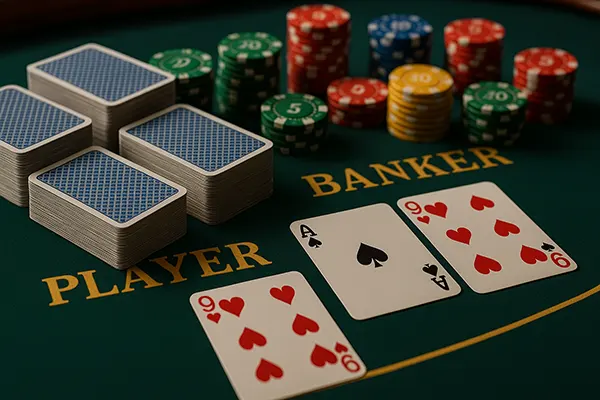
How Odds Change in Baccarat Depending on the Number of Decks: Analysis and Recommendations
Baccarat remains one of the most strategically balanced card games, and even small variations in deck quantity can significantly influence the mathematical odds. In 2025, most online and land-based casinos use between six and eight decks, though single-deck versions are regaining popularity due to their lower house edge. Understanding these differences allows players to make more informed decisions and optimise their strategies.
The Impact of Deck Quantity on House Edge
In baccarat, the house edge is directly affected by how many decks are in play. Fewer decks reduce the house advantage, making certain bets slightly more favourable. For instance, a single-deck game typically offers a house edge of around 1.01% on the Banker bet, while an eight-deck version increases it to approximately 1.06%. Although this difference seems minor, it becomes meaningful over hundreds of rounds.
The reason for this shift lies in probability distribution. With fewer cards, each outcome’s likelihood changes slightly. The removal of just one or two key cards in a smaller deck composition alters the frequency of Banker and Player wins. Consequently, single-deck baccarat tends to provide more consistent statistical behaviour for players seeking tighter control over variance.
However, not every casino offers single-deck games due to slower gameplay and the higher risk of card counting. Therefore, most 2025 operators prefer six- or eight-deck setups as they balance fairness and operational efficiency while maintaining player engagement.
Calculating the Odds in Multi-Deck Games
Mathematically, each additional deck slightly increases the likelihood of a tie, raising the house advantage on tie bets from 14.36% in a single-deck version to around 14.44% in an eight-deck one. The Banker bet remains statistically superior across all variants, but its margin narrows as decks are added.
For example, in a six-deck game, the Banker’s win probability sits near 45.86%, while the Player’s stands around 44.62%. With one deck, these figures improve to roughly 45.96% and 44.68%, respectively. Though this difference is under one per cent, advanced players who rely on long-term edge accumulation treat it as crucial for bankroll optimisation.
In practical play, this means that even modest reductions in deck count can translate to better returns for disciplined bettors, provided they manage their wagers consistently and avoid high-risk tie bets altogether.
Statistical Patterns and Player Behaviour in 2025
Modern baccarat analytics, powered by AI-driven tracking systems, have revealed that deck composition not only affects odds but also influences player psychology. Many players prefer multi-deck games, mistakenly believing that more decks mean “smoother” randomness. In reality, additional decks make the game less predictable for advantage play, while smaller sets reward analytical observation.
Data collected from major 2025 gaming operators such as Evolution and Pragmatic Play shows that single- and dual-deck baccarat sessions record higher win consistency among experienced users. However, these games are often subject to stricter anti-prediction measures, including automatic shuffles after every round, neutralising any counting advantage.
Despite such systems, the awareness of mathematical odds remains a cornerstone of professional baccarat strategies. Understanding how deck numbers shift outcomes allows players to adopt a data-based rather than instinct-based approach to decision-making.
Comparing Land-Based and Online Versions
Land-based casinos tend to use eight decks as standard, as physical handling and surveillance are easier with thicker shoes. Online baccarat, particularly live-dealer versions, often relies on six-deck shoes, balancing gameplay speed with transparency. RNG-based baccarat, found in digital catalogues, can simulate any number of decks, though most adhere to the classic six-deck configuration for fairness certification purposes.
Regulatory authorities in the UK, Denmark, and Malta require all RNG versions to display precise deck numbers within their rule interfaces, allowing players to evaluate their statistical implications before wagering. This transparency has become standard in 2025, promoting responsible gambling and informed play.
Ultimately, the player’s choice between one, six, or eight decks should depend on their comfort with variance, as the long-term expected return differs only marginally. However, those seeking optimal mathematical value still gravitate towards single-deck configurations whenever available.

Practical Recommendations for Baccarat Players
From a strategic standpoint, the ideal approach is to select tables with fewer decks and avoid the tie bet entirely. Even though the tie offers the highest payout, its expected value remains the worst in all deck variations. Banker bets continue to provide the most consistent advantage, especially in games with reduced deck counts.
Players should also review the commission applied to Banker wins, which remains 5% in most cases but may vary slightly depending on the game provider. Some 2025 baccarat variants now feature “no commission” formats; however, these typically include rule adjustments, such as reduced payouts on specific Banker results, effectively neutralising the perceived benefit.
Responsible gambling remains central to modern baccarat practice. Instead of chasing patterns, players should focus on understanding the underlying probability mechanics of deck influence and manage their session length according to predefined budget limits.
How to Choose the Best Version
When choosing between different baccarat formats, players should consider three main factors: deck count, commission rate, and game transparency. A single-deck or dual-deck game with standard 5% commission usually provides the most balanced experience between fairness and accessibility.
It is advisable to test several versions offered by licensed providers to determine which structure best fits one’s playing rhythm. In 2025, software developers have optimised live baccarat interfaces to include real-time statistical displays, making it easier for players to compare outcomes across multiple sessions.
Finally, always prioritise regulated operators certified by authorities such as the UK Gambling Commission or the Malta Gaming Authority. Verified certification ensures the integrity of deck handling, randomisation algorithms, and payout calculations—factors that directly influence your odds consistency over time.
